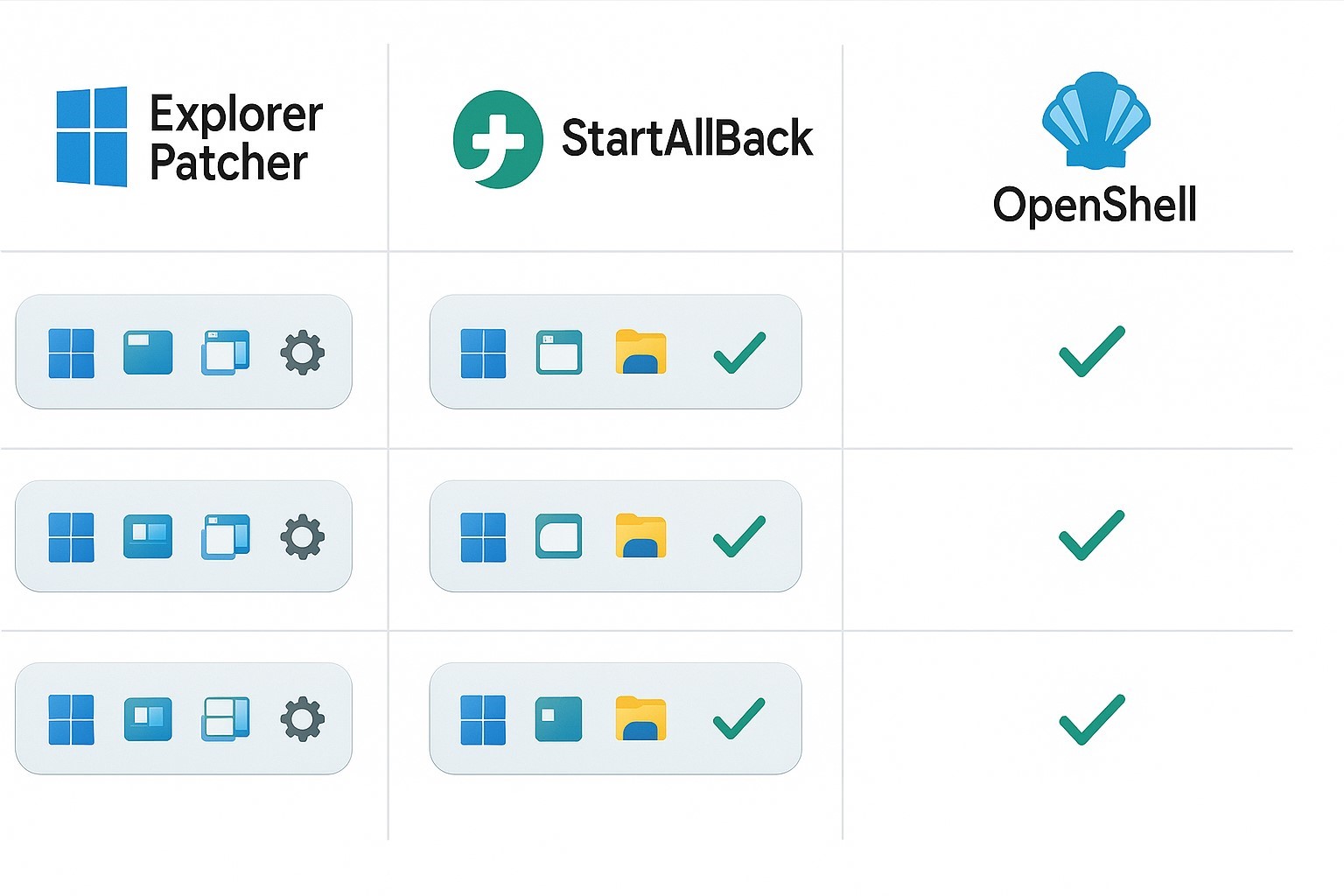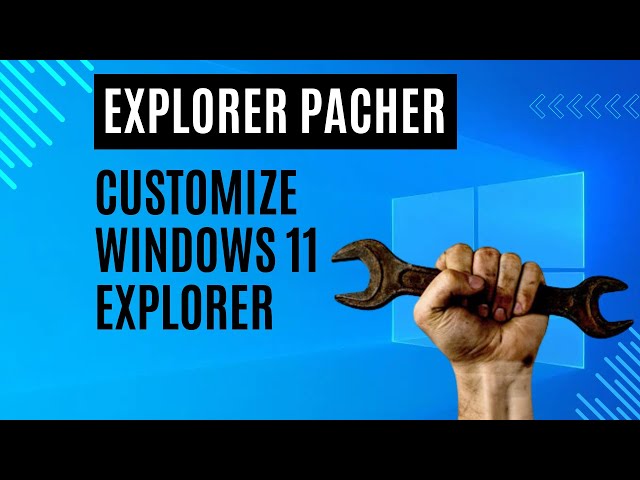Starting with Windows 11, it has to come out with a new aesthetic design and other options. But many users tend to miss the old Windows look, the Start menu, the taskbar alignment, and the transparency effects from previous versions. Enter Explorer Patcher. It is a very powerful tool that enables one to customise the Windows 11 interface so it looks and feels like the good old, classic Windows style.
What is Explorer Patcher?
Explorer Patcher is an open-source utility designed to tweak Windows Explorer and taskbar behavior. It supports restoration of legacy UI elements and further customization that Microsoft does not provide out of the box. It is for restoring the Windows 10 Start menu, transparent taskbars, or context menus with extra options.
Why Use It?
- Customization: It unleashed the classic alignment of the Taskbar with transparency and enhanced context menus.
- Classic UI Restoration: Restore the Windows 10 start menu and taskbar to increase the feelings of familiarity and friendliness.
- Performance: Being lightweight, the program is least likely to hamper system performance while tweaking UI.
Key Features of Explorer Patcher
Windows 11 offers an upgraded experience, for which it provides several key customizations:
Restore Classic Start Menu (Windows 10/11)
Some users find the Windows 11 Start menu limiting. Thus, it restores the Classic Start menu with all the functions, including live tiles, pinned apps, and folders, emulating Windows 10.
Also Read: Gorilla Tag Mods: A Complete Guide to Modding (2025)
Customise Transparent Taskbar
The taskbar transparency in Windows 11 is faint, and you have very few options. With Explorer Patcher, you can create total transparency or apply varying degrees of blur or opacity, resulting in a sleek model for the modern-looking desktop.
File Explorer Tweaks
You can tweak the File Explorer user interface. For example, with Explorer Patcher, you may disable the new command bar, bring back the ribbon menu, and change icon spacing — essentially improving productivity and usability.
Taskbar Alignment & Behavior
Unlike Windows 11’s default centered Taskbar, Explorer Patcher lets you put your Taskbar on the screen’s left, top, or right edges, with icons aligned on the left as in Windows 10.
Context Menu Enhancements
It helps restore the classic context menu with full options upon right-clicking files or folders, thereby improving workflow for older-style menus.
How to Install Explorer Patcher
Download Guide
You should always prefer to download it from the official GitHub repository for safety and to ensure you receive the latest updates.
Installation Steps
- MSI Installer
- Download the .msi file from the Releases page.
- Run it as an administrator.
- Follow the instructions and then restart your machine or log out and log back in to activate the changes.
Manual Installation
- Download ep_setup.exe.
- Copy it to the Windows folder (C:\Windows).
- Run it as an administrator.
Safety & Compatibility Notes
Explorer Patcher supports Windows 11 versions from 21H2 to the most recent one, 23H2.
You might want to create a system restore point before installing it for your safety.
Enabling Transparent Taskbar (Step-by-Step Guide)
A desktop with transparent options makes it look smooth and stylish. Here’s how to enable it.
Method 1: Using Explorer Patcher Settings
- Right-click on the taskbar button and select
- Go to the Taskbar and look for the Appearance
- Enable Transparent or Blur, depending on whatever suits your soul.
- Click on Restart Explorer to activate the changes.
Method 2: Advanced Registry Tweaks (Optional)
- Press Win + R, type regedit, and hit Enter.
- Go to HKEY_LOCAL_MACHINE\SOFTWARE\Microsoft\Windows\DWM.
- Add or modify the DWORD ForceEffectMode and set its value to 1 to apply the blur effect.
- Restart File Explorer or reboot.
Troubleshooting
- If transparency doesn’t come up, ensure you don’t already have another third-party theme or tool installed that interferes with it.
- Update your GPU drivers and disable HDR if you have it turned on.
- Restart Explorer or reboot if changes don’t apply right away.
Further Customisations
Modifying Levels of Transparency
Explorer Patcher can adjust transparency and blur levels using sliders found in its settings.
Visualization for readability may be tuned this way.
Blur Effects & Colour Matching
Employ built-in blur and colour matching to create a superb Mica effect that gives the Windows 11 native UI a polished appearance.
Integrating with Other Tools
Depending on the applications used, it can also be coupled with MicaForEveryone for a better blur effect or TranslucentTB for more dynamic transparency on the Taskbar.
Performance & Stability
Does Transparency Affect Performance?
Windows Virtual PC, performing most of its effects on modern PCs, would minimize the impact on performance. Seeking older hardware slowdowns might be noticed, and reducing or disabling transparency may improve performance.
Common Bugs & Fixes
- Taskbar disappearing: Restart File Explorer from Task Manager.
- Start menu glitches: Reinstall it or reboot.
- Settings not saving: Run Explorer Patcher as an administrator.
Updating Explorer Patcher Safely
Keep checking the GitHub official page. Download the latest installer, run it over your existing version, and reboot your PC.
Alternatives to Explorer Patcher

If Explorer Patcher doesn’t quite suit you, these are some other options:
- StartAllBack: Paid but very polished Start menu and Taskbar customization with frequent updates.
- Classic Shell (Open-Shell): Free software to restore the old Start menus.
- RoundedTB: Specialized for rounding the taskbar corners and making other margin tweaks.
Frequently Asked Questions (FAQs)
-
Is Explorer Patcher Safe?
Yep, when downloaded from the official sites, it is widely accepted and reliable in the Windows customization community.
-
Does It Work on Windows 11 23H2+?
Yes. This developer-maintained application is regularly updated to accommodate the recent Windows builds.
-
How to Revert Changes?
Uninstall Explorer Patcher from the Control Panel, and restart your system. If the problems persist, go back to restoring the earlier state with System Restore.
